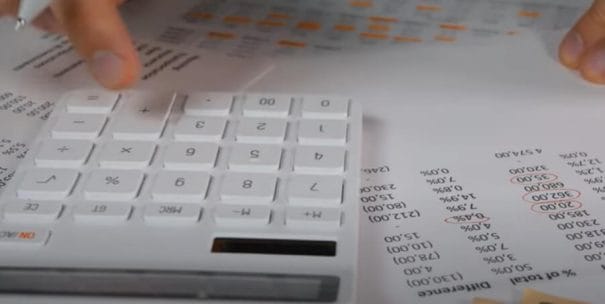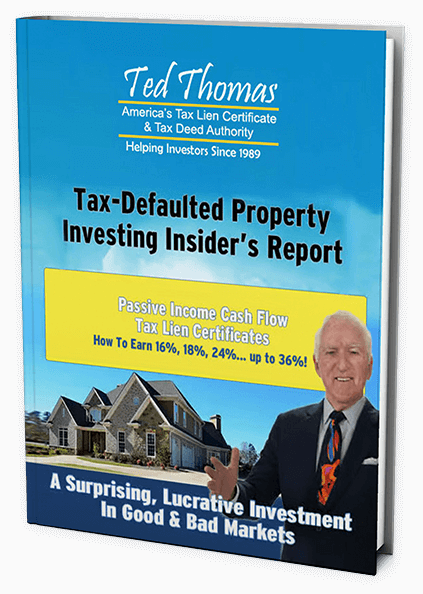Introduction to the Tax Sale Overage
In this interview, Ted talks about tax sale overages, what they are, who can claim ownership, and how to potentially profit from them.
When a property owner fails to pay property taxes, the county or municipality will hold a tax sale to auction off the property in order to recoup the back taxes that are delinquent.
The bidding begins at the back taxes. However, the property may be bid up, and the winning bid could be more than the amount of the back property taxes owed. What happens then?
You may watch the video above, or if you prefer, read the transcript below.
The topics to be covered in “Overages: What Are They?” are:
What is an Overage?
When the proceeds from the sale exceed the amount owed in taxes, this excess amount is an overage. For example, if a $400,000 property with a tax bill of $20,000 is sold at a tax sale for $80,000, the $60,000 difference is a tax sale overage.
An overage is typically held by the county or municipality until the rightful owner comes forward to claim it.
Who is the Rightful Owner of Tax Sale Excess Proceeds?
Who is the rightful owner? The tax defaulted property owner whose real estate was seized and sold at the tax sale is the rightful owner of the overage. However, there are some exceptions to this rule, like the states of New York and Michigan, which keep the overages.
According to state and local laws in states where overages can be claimed, the overage money is held for a certain period of time before it’s deemed unclaimed and escheats to the local government.
What is a Tax Sale Surplus Recovery Business?
Many homeowners who lost their property due to unpaid taxes are unaware that they can claim the overage, and this has opened up a business opportunity for people who do the research and act as finders.
A finder is someone who locates the rightful owner and helps them claim the overage money in exchange for a percentage of the recovered funds.
Here’s how it works:
- Research tax sale results: Finders begin by researching properties that have been sold at a tax sale in the area. This information is publicly available through the county or municipality’s website.
- Check for overages: Once the finder identifies a property that’s been sold at a tax sale, the finder checks to see if there was an overage. This information may also be available through the county or municipality’s website or by contacting them directly.
- Locate the rightful owner: Next, the finder locates the rightful owner of the overage money. This can be done by searching public records.
- Notify the owner: Once the rightful owner is located, the finder reaches out to let them know that they may be entitled to a sum of money.
- Help the owner claim the overage: Finally, the finder assists the rightful owner in the process of claiming the overage money.
Acting as a finder is not illegal, but it’s important to be aware of the laws and regulations in your area and to always act ethically and legally. It would also be prudent to contact an attorney to draw up a contract and consult an accountant before jumping into the overages business.
Conclusion
Tax sale overages can present an opportunity for profit as a finder. By researching properties that have been sold at a tax sale, checking for overages, locating the rightful owner, and assisting them in claiming the funds, a finder can potentially earn a percentage of the recovered overage money. However, it’s important to know and follow the laws and regulations in your area.
While a tax overages business may seem like a quick way to make money, it requires a lot of research, and a finder may face rejection from skeptical property owners or have to chase payments.
Ted Thomas does not teach how to profit from overages, but answers the question because it comes up from time to time.
Ted prefers the much more profitable business of purchasing tax defaulted properties from the county and reselling them using his quick-cash-flow generating “buy low, sell low” strategy.
If you want to learn more about tax defaulted real estate, view more of Ted’s free videos.
Ted is the authority on the subject of tax lien and tax deed investing and has been teaching students how to buy and sell bargain real estate for over 25 years.
Want to learn how to invest in bargain real estate and earn profits beyond your wildest dreams? Would you like to buy mortgage-free homes for pennies on the dollar? Or earn double-digit interest rates secured by real estate? Then you don’t want to miss this FREE Gift.

Read the Transcript
Overages: What Are They
Randy: Welcome everybody, thanks for joining us. I’m Randy, but more importantly, that’s Ted Thomas. Ted, you always have the most colorful and bright and happy shirts. They scream, you’re in Florida, right?
Ted: Right. Thanks for the compliment. I appreciate that. Actually, when you’re an old, ugly guy, you have to do something to get attention. So, pretty quick, I’ll start wearing a hat because all my hair’s almost fallen out.
Randy: Another way Ted gets attention, in case you didn’t know, is that Ted is the authority on tax certificates and tax auctions, anything with tax deeds and liens. You’ve been doing that for longer than Moses, haven’t you, Ted? I saw some of your old videos. I saw that young guy with black hair, and I said, “Who’s that guy who thinks he’s Ted Thomas?”
Ted: That was me. I’ve been doing this for about 30 years. So, if you want to do some questions, let’s get down the business and do some questions.
Randy: Well, there is one in particular, Ted. I want to talk to you about overages. Folks have mentioned they can make money with tax sale overages. Can you explain a little more about what that is, and how does that relate to the tax sale auctions that I normally hear you talking about?
Ted: At a tax auction, they start the bidding at a very low price, basically the back taxes. Then the auction goes up, and the highest bidder gets it. Let’s say you’ve got a $400,000 house, and it goes to auction. The auction might start at say, $20,000. It goes up and up. Maybe a guy gets it for 20 cents on the dollar.
Ted (cont’d): He spent $80,000, but he got a $400,000 house. But remember, the taxes were low, only around $20,000, and he paid $80,000. The difference between the $20,000 that’s owed to the government and the $80,000 that he paid is $60,000. That’s quite a bit of money. So the question always is, whose $60,000 is that?
Ted (cont’d): Well, the money actually belongs to the guy that owned the house. Whoever owned the house, it was their house that got sold at auction. That money actually belongs to the person that owns the house, except nobody tells him that.
Ted (cont’d): It went to auction. The county takes the money in, and the money sits there at the county. If nobody shows up and asks for the money, the county is just going to keep it and spend it wherever they want.
Randy: Wait, wait, let me hear this. Say they take my house. The county puts it up for auction, and somebody buys it. I’m entitled to that money if I want it.
Ted: Exactly, it’s your money, and the county knows that. They recognize that it’s your money, but if you don’t come and ask for it, they don’t send it. You have to go down and apply for your own money. There’s actually so much of this going on. It’s in terms of millions of dollars.
Ted (cont’d): Let’s paint the picture correctly. Nationwide there are 5,000 tax defaulted auctions every year. Every time a property is sold over the amount of the minimum bid, that’s an overage. In other words, it’s more money than the county wanted.
Ted (cont’d): When the county is selling a property, they’re only selling the property because they want the cash to pay the taxes. So, property taxes are what run the government. In other words, the local government’s run on property taxes.
Randy: So to be clear, the overage is everything. If I owed $20,000 in taxes, then the county took my house and they sold it for $60,000, that $40,000 represents the overage.
Ted: Right. Exactly.
Randy: Okay
Ted: What if the house is a $400,000 house, and it sold for $200,000 at the auction for only $20,000 in taxes. When the $200,000 comes in, the $20,000 goes to the county. The rest just sits there and sits there. If people don’t go in and claim it, the county is just going to keep it.
Randy: That’s the question then. How do you claim it? How do people claim tax sale overages?
Ted: Any property owner that owned that property could go there and claim it, and they’ll give them the money. It’s just as simple as that, but people hear about this and say, “Oh, the owners don’t come in and claim it.”
Ted (cont’d): Let me tell you about people that had their house go to auction. They’ve probably got a lot of bills on there. They probably aren’t paying their mortgage and probably got a lien on it. Maybe they didn’t pay the divorce, or they owe child support, all these different things.
Ted (cont’d): So, properties that go to auction might have a lot of liens on them. I mean many, multiple liens. When the auction takes place, all the liens are wiped out. So now what happens to the person that lost the property, they’re probably going through depression.
Ted (cont’d): They’re probably going through some bad times in their life. They just think, “My property went to auction.” But if it went to auction and there’s money left over, an overage, it’s their money.
Ted (cont’d): There are only two states that I know of that don’t pay the overages. One is Michigan, and the other one is New York. The other 48 states all pay that, and the property owner can go and ask for that money. It’s perfectly legal to do that. It’s their money. As simple as that. It’s not a difficult thing.
Ted (cont’d): What brings the question up is that other people go out and promote it and say, “Look, there’s all this money sitting at the county that you can get.” So, why don’t you make yourself into a finder? Then you go to that guy and say, “I’ve found a whole bunch of money that’s yours. If you’ll give me half of it, I’ll tell you where it is.”
Randy: So that’s what this deal is. If I get word that this county sold somebody’s house. They got a $100,000 overage. If I find that out, then I can go to the guy and say, “Hey, listen buddy, you think you’re out of a house? You think you’re out of $100,000? I can get it for you, but I want $50,000.” I’m just making up those terms, Ted. Is that what you’re talking about?
Ted: That’s exactly what they do.
Randy: Okay, but tell me, if the guy who owned the house that the county took from him and he doesn’t know the money’s there, how the heck am I going to possibly know the county has got some money sitting around from the house they sold.
Ted: You can find that out because you can go to the county records. You can learn how to do that. They’ll have a list with all the overages. The list is going to be as long as your arm. There are going to be a lot of them. There’s not going to be just one. There are going to be literally dozens of those at every county.
Randy: Now, then if I find something, can I claim the house or the overage, or do-
Ted: No, you can’t claim it. You have to go to the owner and get them to claim it.
Randy: Okay gotcha.
Ted: You’re going to be like a finder. You’re like a finder.
Randy: Okay, I’m like a Columbo. I’m a Columbo for this guy’s house, and I find his house and I say, “I found it. Come on in, give me a cut because I found it.”
Ted: Yeah.
Randy: Okay, that’s kind of interesting.
Ted: Well, there are a lot of people that have ethical concerns about it. Is that really fair? I’m not in the business of deciding what’s fair and what’s not. I’ve been a tax default expert for a lot of years, so I’ve learned a lot of these different things.
Ted (cont’d): I want to just buy it from the county. I got a nice deal going there. They’re going to give me records and then I can resell it. I can do a quiet title and get the property sold. That’s my way of doing business.
Ted (cont’d): Why set myself up for disappointment? Let’s say there’s $100,000 on the overages list. So I go and see John Q. Public and say, “John, how are you? I found $100,000. If you’re willing to split it with me, we can go through the process.” Well, what if the guy says no?
Randy: You tell me, what if he says no? Can you do anything, or that’s it?
Ted: No, now, you just walk away. You both just walk away, but why set myself up for disappointment?
Randy: Let me ask you another question. What if he says, yes, yeah, sure? What do you do then? How do I know he’s going to make good on his deal with me? Do I have to have a contract ahead of time? Do I need to bring in a lawyer, an accountant?
Ted: You have to do both of those things. You either get a lawyer to write the contract, or you buy someone’s contract and do it that way. So that’s a bit of a challenge.
Ted (cont’d): I don’t teach that personally because I’m really an expert at buying tax defaulted real estate, and then I want to resell. I want to buy the property at a bargain price then be able to put it back into the marketplace and make money on the margin.
Ted (cont’d): I buy it low and then I want to sell it at lower than the actual price of the market. That’s what business I’m in. Overages just comes up from time to time. When it does, I understand the business, but I’m not part of it.
Randy: Okay, but you would recommend, if somebody’s going to do it, you’re probably going to have an accountant, and a lawyer to write the contract.
Ted: Well, your instincts are perfect. They’re going to need an accountant and a legal contract. They’re going to have to understand that they’re going to do a lot of research just to find the people and communicate with them.
Ted (cont’d): I don’t know, if I called you up and said I found $100,000 that belonged to you, I don’t know what your reaction’s going to be. Could be good, could be bad.
Randy: Well, it could be. I think your way kind of sounds easier actually.
Ted: Yeah, much easier, much easier, exactly.
Randy: So in terms of overages, if I was thinking about doing that, I would definitely need an accountant. I would definitely need a lawyer. I might need a heavy, like Vito, or something like that, to go break some kneecaps.
Ted: No, no, you can’t do that. You don’t need Vito. You don’t want Vito because that’s going to scare the guy away. You just want to keep it simple. It’s an unusual question. We talk about overages to advanced-level people.
Ted (cont’d): I tell people to be very cautious when you’re doing tax liens and tax deeds, to understand what you’re doing. And when people ask me about overages, there’s this sense that it’s quick money, that it’s going to be fast, and they’re going to get wealthy because that’s what the way late-night television will tell them to do.
Ted (cont’d): Or maybe on the internet they’re learning stuff telling them they’re going to make money quickly. I’m not in that business. I’m really in the business of teaching people a step-by-step process. It’s a little slower, but it’s very comfortable for me and the staff I have. I have a big staff that teaches along with me, guides and coaches and all that.
Randy: You’re the number one online coach, teacher of this.
Ted: Yeah, well, I have the only online courses in the world that can teach you from A all the way to Z, about tax lien certificates. I have coaches that will teach you about it. We actually hold your hand and take you all the way to the auction and go through the auction with you. We take small groups, half a dozen people. We do all of that kind of stuff for people.
Randy: Ted, do you have an overview video that people can watch and get a sense of what they can get from working with you?
Ted: Yeah, should we throw it in right now?
Randy: Sure, everybody would like to see it.
Ted: All right.
Randy: Hey, so that looks pretty cool, Ted.
Ted: Thank you, the learning stuff is. The beauty of doing everything on YouTube is that you can go back and watch it again, and you can get on to learning. Learning is a blessing, but it’s something you have to do for your whole life. You never stop.
Randy: Yeah, sure.
Ted: There’s always something new. Always.
Randy: Thanks for watching.
Be sure to get your Free Gift.




